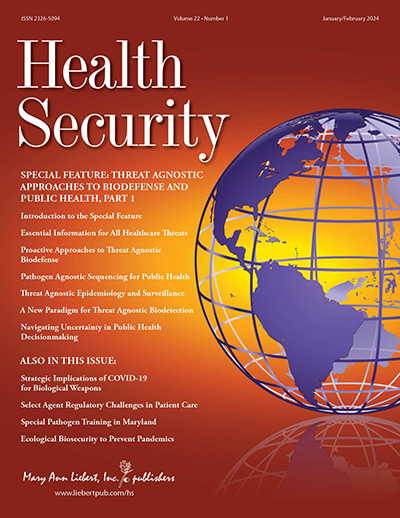Journal
Health Security

Editor-in-Chief: Thomas V. Inglesby, MD
Managing Editor: Kathleen A. Fox, MSc, MA, MPH
Health Security is a peer-reviewed journal providing research and essential guidance for protecting people's health before and after epidemics or disasters and for ensuring that communities are resilient to major challenges. The Journal explores issues posed by disease outbreaks and epidemics; natural disasters; biological, chemical, and nuclear accidents or deliberate threats; foodborne outbreaks; and other emergencies. It offers important insight into how to develop, adapt, and rethink the systems needed to meet these challenges. Taking an interdisciplinary approach, Health Security covers research, innovations, methods, challenges, and ethical and legal dilemmas facing scientific, military, and health organizations. The Journal is a key resource for practitioners in these fields, policymakers, scientific experts, and government officials.
The Journal is under the editorial leadership of Editor-in-Chief Thomas V. Inglesby, Managing Editor Kathleen A. Fox, the associate editor team, and the editorial board. View the entire editorial board.
Health Security coverage includes:
- Scientific, medical, and policy advancements that might help prevent or respond to epidemics
- Future directions and innovations in public health that improve response to major health events
- Guidance for healthcare organizations planning to cope with mass casualty crises
- Initiatives or concepts intended to reduce agricultural vulnerabilities
- Military and intelligence roles and contributions to biodefense strategy and response
- Communication methods and challenges for decisionmakers, the media, and the public
- Ethical and legal dilemmas posed by major health events
- Impacts of systemic racism, social and structural inequities, and related challenges on health security research, policymaking, and practice
Health Security is indexed/abstracted in: MEDLINE; PubMed; PubMed Central; Current Contents®/Social & Behavioral Sciences; Social Sciences Citation Index®; Social SciSearch®; Journal Citation Reports/Social Sciences Edition; EMBASE/Excerpta Medica; EMBiology; Scopus; ProQuest; CAB Abstracts; Global Health
ISSN: 2326-5094 • Published Bimonthly • Online ISSN: 2326-5108
For more information, visit the journal website.
Information for authors
Read the author instructions for submitting a manuscript.
Current Issue
Our January/February 2024 issue of Health Security, which includes Part 1 of the Threat Agnostic Approaches to Biodefense and Public Health special feature, is now available online. Read its articles, case studies, commentaries, and letter to the editor.
Highlighted Supplement
Reimagining US Public Health Preparedness with Lessons from COVID-19
This supplement of Health Security was produced in partnership with the National Association of County and City Health Officials and the 2022 Preparedness Summit Planning Committee. The aim of the supplement was to extend conversations from the 2022 Preparedness Summit regarding the experiences of the public health workforce during the COVID-19 pandemic and to contribute to a growing body of knowledge about the pandemic and its impact on public health preparedness.
